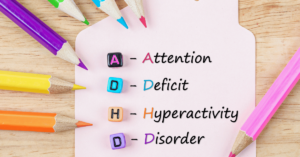Attention deficit hyperactivity disorder (ADHD) is increasingly being examined for links with substance abuse. Recent research suggests that those diagnosed with ADHD develop substance use disorders (SUDs) with measurable consistency. In fact, children with ADHD are “significantly more likely” to abuse substances than their peers in the general population. (More on that below.) This association may not come as a surprise, given the core symptoms of ADHD which include difficulty focusing, impulsivity and restlessness. To say the least, ADHD and addiction have a connection. The nature of that connection represents a large question mark.
Could ADHD Cause Drug Addiction?
Most research affirms that while ADHD doesn’t cause addiction it does increase the risk that someone could develop a substance use disorder. A 2011 study published in Clinical Psychology Review analyzed the correlation between ADHD and substance abuse. Substances in question primarily focused on alcohol, cocaine, marijuana and nicotine. This longitudinal study followed children with and without ADHD. Researchers determined that children with ADHD were two to three times more likely to abuse substances.
Jeannette Friedman, LCSW, said children with ADHD prove to be very easily sensitized. She’s a therapist who works with families struggling with substance use issues. She told Child Mind Institute that, when they encounter a substance’s calming effects, they can feel relief. They feel a greater need for that relief than their peers due to ADHD usually robbing them of that calm.
Productive behaviors that may help manage their ADHD symptoms, such as meditation or exercise, can become more challenging to engage in because substances offer quick results with which it’s difficult to compete.
“So, when kids are introduced to a substance that calms them down, it feels good to them,” Friedman said. “Trying to engage in more productive behaviors to manage their ADHD, such as meditating or going for a walk, becomes much harder because a substance provides such a quick fix. There’s just nothing that can compete.”
Dual Diagnosis of ADHD and Addiction
 Published two years after the 2011 study, another study in Addictive Disorders & Their Treatment noted that a lot of research had already highlighted comorbidity between ADHD and substance use disorder. It identified ADHD as “an independent risk actor for developing nicotine, alcohol or other substance abuse or dependence.” The same study also found the comorbidity of conduct disorder — a subset of ADHD presentations — to correlate with even greater risk.
Published two years after the 2011 study, another study in Addictive Disorders & Their Treatment noted that a lot of research had already highlighted comorbidity between ADHD and substance use disorder. It identified ADHD as “an independent risk actor for developing nicotine, alcohol or other substance abuse or dependence.” The same study also found the comorbidity of conduct disorder — a subset of ADHD presentations — to correlate with even greater risk.
Ultimately, the 2013 study found proof that as many as one in four adults who have an SUD also have a comorbid ADHD. A 2016 study similarly found ADHD “highly prevalent” among those treated for SUD. However, that study further concluded that this was the more severe, non-remitting form of ADHD most often.
Diagnosis and Treatment Modalities for ADHD
It’s important to note the 2016 study found some 22.7% of kids met diagnostic criteria for ADHD. It also found 78.6% of them carried this into adulthood, typically with conduct disorder and past treatment for ADHD. This tracks somewhat closely with the 2013 study finding that about 60% of ADHD patients still present symptoms in adulthood.
One x-factor hiding behind this correlation is the commonality of stimulant treatment for ADHD. A 2019 study acknowledged this gap in the data from the past decade and attempted to find answers. The research team found stimulant use profiles influence the risk of SUDs. Long-term outcomes correlated with how treatment was administered, which study authors claimed is “often ignored.”
You may have been diagnosed with ADHD during childhood. You probably didn’t think that had anything to do with your substance abuse today. Nevertheless, if you’re abusing substances now, talk to an addiction specialist immediately at 888-448-0302. They can connect you to the nearest drug and alcohol rehab location that effectively treats not only addiction but the comorbidities that come with it.
Impulsivity, ADHD and Addiction
Furthermore, ADHD can make teenagers more susceptible to addiction, as their brains tend to experience the effects of all substances more intensely. Sarper Taskiran, MD, a child and adolescent psychiatrist at the Child Mind Institute, explains that kids with ADHD tend to have a higher vulnerability to addiction and may progress to addiction faster than their neurotypical peers due to their tendency toward impulsivity.
“Their brains are hungrier for these experiences because of their wiring.” That’s how Dr. Taskiran put it.
Many stimulants are known to increase impulsivity rather than decrease it. In particular, these illicit stimulants like methamphetamine. The same impulsivity that results from this is theorized by some experts in the field to make it difficult for those in recovery from chronic substance abuse to avoid relapse.
How SUDs Result from Self-medicating ADHD
Marijuana is currently the most commonly used substance by teens and young adults with ADHD, with alcohol and nicotine following closely behind. However, Dr. Taskiran suggests that children with ADHD are not necessarily seeking to get high, but rather self-medicate to alleviate symptoms related to their condition.
Kids with ADHD tend to be more hyperactive and impulsive, which can be tiring for them. They often gravitate toward substances that slow down their thoughts, with nicotine and cocaine being appealing because they increase attention in the short term, while marijuana can induce mild sedation and euphoria.
It is also important to note that research has shown that kids with ADHD have a higher rate of alcohol abuse. These findings underscore the need for increased awareness of the risks associated with substance abuse among individuals with ADHD and the importance of developing effective prevention and treatment strategies to support these vulnerable populations.
In essence, an ADHD diagnosis targets several risk factors for the later development of SUDs. The research has only continued to reveal more and more data to support the correlation between ADHD and SUDs. Therefore, those with ADHD should be monitored more closely and their needs met more frequently. If you know your use of a drug or alcohol has gotten problematic and you know you were diagnosed with ADHD as a child, go to Landmark Recovery and get addiction treatment that addresses both of those issues.

Choose Recovery Over Addiction
We're here 24/7 to help you get the care you need to live life on your terms, without drugs or alcohol. Talk to our recovery specialists today and learn about our integrated treatment programs.




